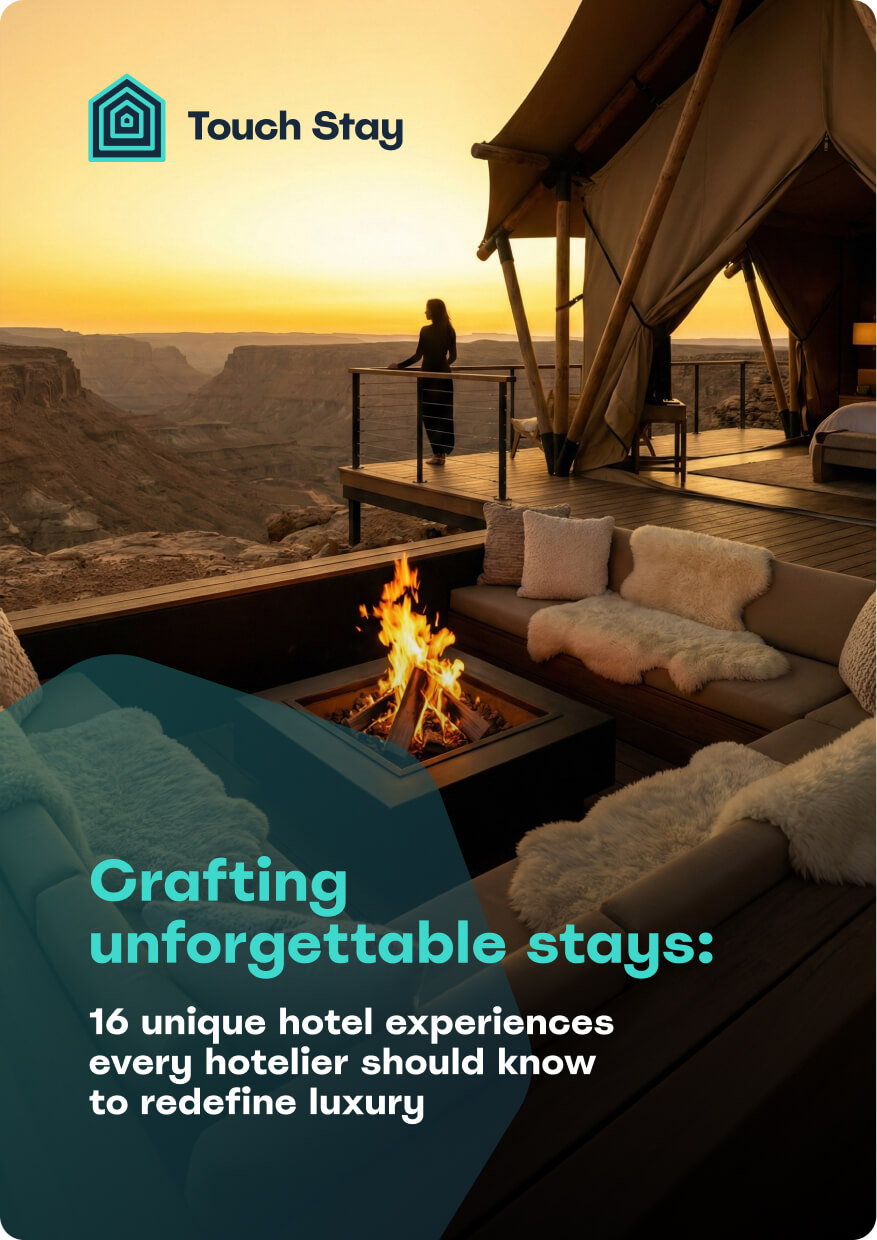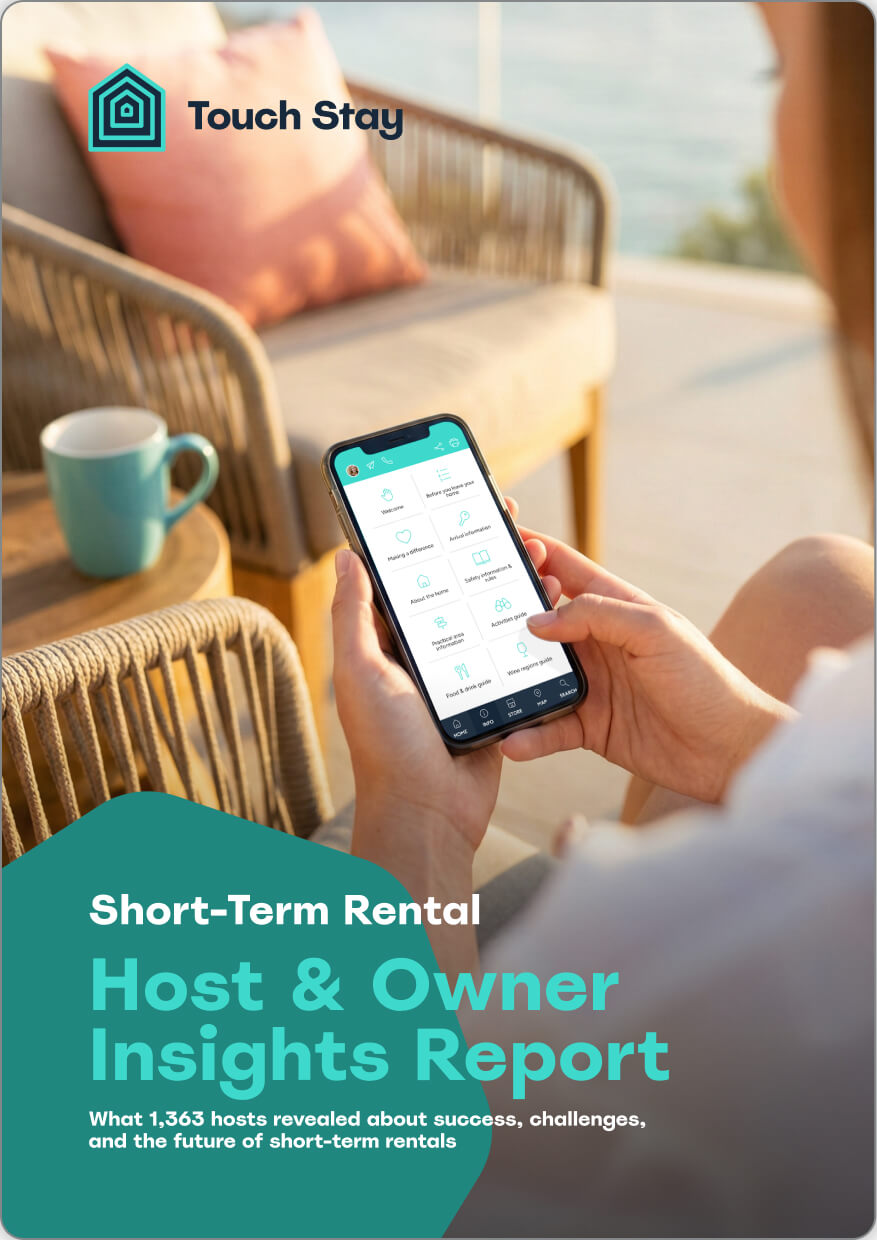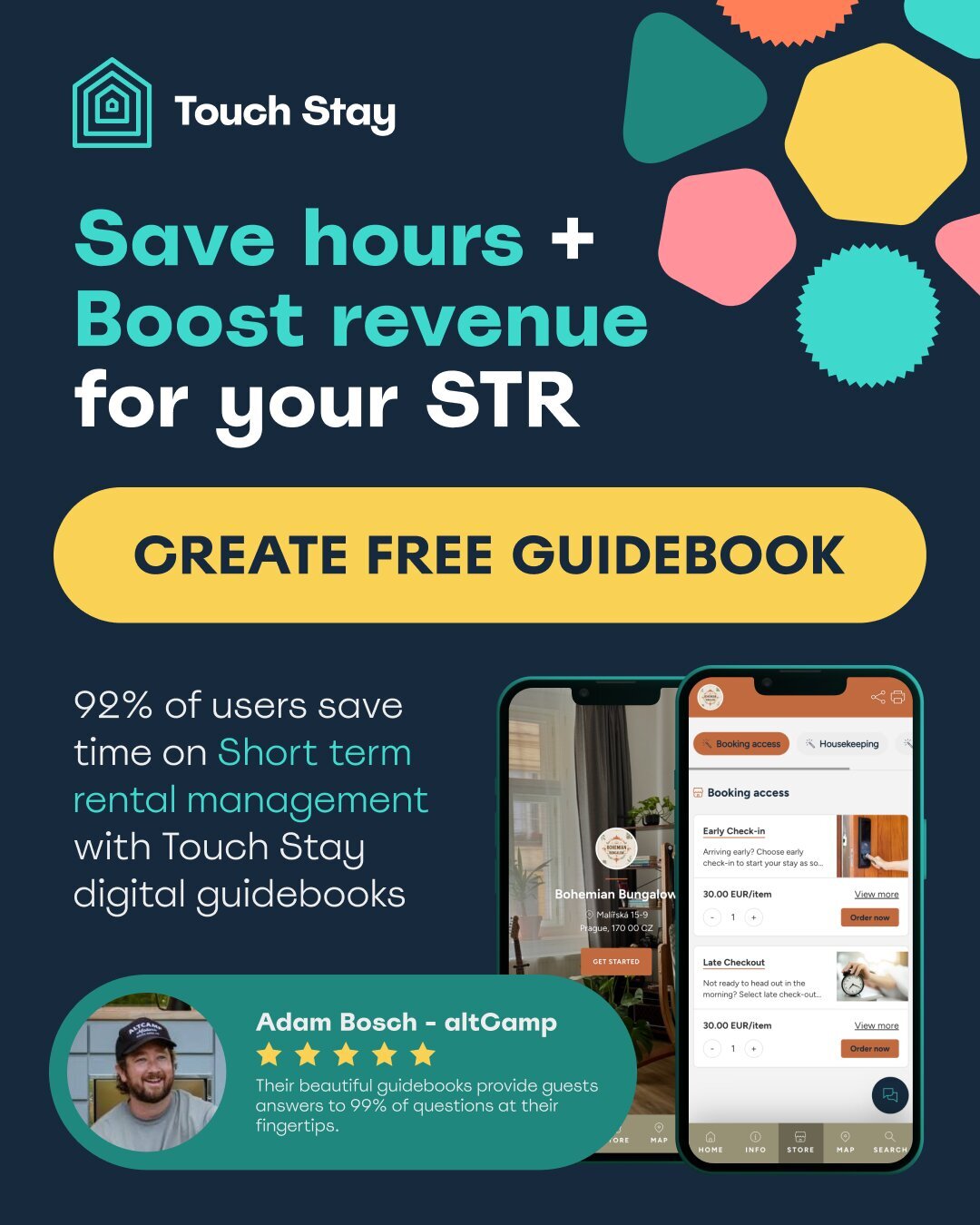You’ve poured your heart into creating the perfect short-term rental. The furniture is just right, the amenities are top-notch, and the location is ideal. But in a crowded market, simply having a fantastic property isn’t enough. To stand out from the competition, consistently attract guests, and maximise your profitability, you need a robust and effective marketing strategy.
This comprehensive guide will equip you with the essential knowledge and actionable strategies to master vacation rental marketing, boost your bookings, and significantly increase your revenue.
Read on to discover:
- Why a marketing strategy matters for vacation rentals
- 13 Best vacation rental marketing strategies
- Common mistakes to avoid in marketing your vacation rental
Want a shortcut to boosting your STR revenue?
Why a marketing strategy matters for vacation rentals
In a crowded marketplace, a well-defined marketing strategy is the crucial element that separates the thriving properties from those that struggle. It’s not just about getting more bookings; it's about building a sustainable business that thrives in any economic climate. A solid strategy helps you control your brand narrative, reduce reliance on third-party platforms, and cultivate a loyal guest base.
Visibility on OTAs and Google
For many hosts, online travel agencies (OTAs) are the primary source of bookings. While these platforms are invaluable, the competition is fierce. To succeed, your listing must be optimised to appear prominently in search results. This involves more than just having a nice photo. You need to understand the algorithms, use the right keywords, and maintain a high-quality listing with positive reviews.
The platforms you need to focus on include:
- Airbnb
- Vrbo
- Booking.com
- Google Vacation Rentals
Beyond the OTAs, appearing on Google is the ultimate goal. When potential guests search for "vacation rental in [your location]," you want your direct booking website to be a top result. A strong SEO (Search Engine Optimisation) strategy is key here, ensuring your brand is visible and accessible to a wider audience, which in turn drives more traffic to your own channels.
Direct bookings and increasing profitability
While OTAs are excellent for exposure, they come with a significant cost: commissions. These fees can eat into your profit margins, sometimes by as much as 15%. This is why one of the most important goals of your vacation rental marketing strategy should be to drive direct bookings.
By encouraging guests to book directly through your own website, you benefit in several ways:
- Increased Profitability: You eliminate the hefty commissions charged by OTAs.
- Brand Control: You gain control over your brand narrative and the entire guest relationship.
- Data Ownership: You can collect valuable guest data for future marketing efforts and personalised offers.
- Loyalty and Repeat Business: You can offer personalised experiences that foster repeat business and glowing reviews.
A successful direct booking strategy directly translates to a more profitable and sustainable business.
Pro tip: discover the benefits of direct bookings for vacation rentals
13 Best vacation rental marketing strategies
A successful marketing strategy is built on a combination of different tactics. Here are 13 essential strategies you should implement to elevate your short-term rental business.
1. Define your ideal guest
Before you can effectively market your property, you need to know who you’re marketing to. Who is your ideal guest? By creating a "guest persona," you can tailor every aspect of your marketing to appeal directly to this specific audience. This targeted approach is far more effective than a generic one-size-fits-all strategy.
Your ideal guest might be:
- A family with young children looking for a safe, well-equipped space.
- A romantic couple on a weekend getaway.
- A remote worker seeking a quiet, comfortable spot with reliable Wi-Fi.
2. Craft a unique listing & brand identity
Your brand is more than just a logo; it's the personality and promise of your property. What makes your place special? Is it the quirky vintage decor, the stunning sea view, or the luxurious spa-like bathroom? Highlight these unique selling points. Give your property a memorable name and a consistent voice. This brand identity should be reflected across all your channels, from your Airbnb listing to your social media profiles.
3. Create titles, descriptions, sentiment and length for higher conversions
Your listing title and description are your sales pitch. They need to be compelling, informative, and keyword-rich to grab attention. A great title should include your property's key features and location. When writing descriptions, focus on the benefits for the guest. The tone should be inviting and enthusiastic.
To craft a high-converting description:
- Use a compelling title with key features and location.
- Focus on benefits, not just features (e.g., "Cosy fireplace" instead of "There is a fireplace").
- Use evocative language to help guests imagine their stay.
- Provide enough detail to answer common questions without being overwhelming.
4. Utilise professional photography & video tours
High-quality visuals are non-negotiable. Guests book with their eyes, and a blurry phone photo will do your beautiful property a disservice. Invest in professional photography that captures your property in the best light. The photos should be bright, well-composed, and show off the key features of your home. Video tours are the next step up. A professionally shot video can give a potential guest a much better feel for the space and help them imagine themselves staying there.
5. Try messaging across listings, website and social media
Consistency is key. The messaging you use to describe your property should be the same across all platforms. This includes your listing on Airbnb, your website, and your social media pages. This consistency reinforces your brand identity and prevents confusion. Ensure your contact information, check-in instructions, and cancellation policies are all consistent.
6. Optimise your content with SEO
Search Engine Optimisation is a powerful tool for driving organic traffic to your direct booking website. By using relevant keywords in your website content, blog posts, and property descriptions, you can improve your ranking on Google and other search engines.
To find the best keywords for your vacation rental marketing, you can use tools like Mangools. Mangools provides an intuitive suite of SEO tools that help you find high-volume, low-competition keywords, analyse your competitors, and track your ranking progress. Focusing on local keywords (e.g., "vacation rental Pembrokeshire") and long-tail phrases ("family-friendly cottage with a hot tub in Pembrokeshire") will help you attract highly qualified traffic.
7. Promote your brand via paid & organic channels
Once you have a strong brand identity and a website, it's time to promote it. A strategic blend of both paid and organic channels is often the most effective approach. Use organic content to build a community and nurture relationships, while using paid ads to reach new audiences and drive immediate bookings.
8. Use email marketing campaigns
Email marketing is one of the most effective ways to build a loyal guest base and drive repeat bookings. Collect email addresses from past guests (with their permission) and use them to send out newsletters. These newsletters can include special offers for returning guests, updates about your property, or local event guides. It’s a fantastic way to keep your brand top of mind and encourage people to book with you again.
Pro tip: check out our ultimate guide to vacation rental email marketing & email capture
9. Try social media promotions
Social media is a great platform for showcasing your property's personality. Instagram, Facebook, and TikTok are all excellent platforms for short term rental marketing.
Consider the following for your social media promotion:
- Use high-quality photos and videos to highlight your property's features.
- Create engaging content like Reels and Stories to give a behind-the-scenes look.
- Encourage guests to share their photos and tag your property for user-generated content.
Pro tip: get some inspiration from our 101 social media ideas: how to promote your vacation rental property
10. List your brand on Airbnb, Vrbo, Booking.com, Google & niche platforms
While direct bookings are the goal, listing your property on major OTAs is essential for visibility. Don't limit yourself to just one platform. Maximise your exposure by listing on:
- Airbnb
- Vrbo
- Booking.com
- Google Vacation Rentals
- Niche platforms that cater to a specific type of traveller
11. Manage channels and calendar sync
With your property listed on multiple platforms, channel management becomes a crucial aspect of your short term rental marketing. Manually updating calendars can lead to double bookings and guest disappointment. Use a reliable channel manager to automatically sync your calendars across all platforms. This saves you time, prevents errors, and ensures a smooth guest experience.
12. Try various pricing & promotional tactics
Pricing is a powerful marketing tool. Don’t just set one price and forget about it. Implement dynamic pricing strategies that adjust your rates based on demand, seasonality, and local events. Offer discounts for longer stays, last-minute deals, or special packages. These strategies can help you maintain a high occupancy rate year-round.
Pro tip: learn more with out Airbnb pricing strategies in 2025: a comprehensive guide to maximising your short-term rental revenue
13. Utilise digital guidebooks
A key component of providing an exceptional guest experience is clear and accessible information. This is where a digital guidebook comes in. It consolidates all the vital information a guest needs, from check-in instructions and Wi-Fi codes to local restaurant recommendations and house rules.
A digital guidebook, like those offered by Touch Stay, not only reduces the number of questions you get from guests but also enhances their overall experience.
Key benefits of a digital guidebook include:
- Time-saving for hosts: It reduces repeated guest questions, freeing up your time.
- Enhanced guest experience: It provides a professional, organised, and convenient way to access all key information.
- Consistency and branding: It allows you to maintain a brand-consistent voice throughout the guest journey.
- Improved reviews: A seamless experience often leads to more positive reviews and repeat business.
Ready to streamline your guest communication and create a five-star experience?
Common mistakes to avoid in marketing your vacation rental
Even with the best strategies in place, it's easy to fall into common traps. Avoiding these mistakes is just as important as implementing the right tactics.
Inconsistent information across channels
Inconsistency is confusing and unprofessional. It erodes trust and can lead to negative reviews. Ensure all information is consistent across all your listings and marketing channels.
This includes:
- Pricing and availability
- House rules
- Check-in/check-out times
- Contact details and emergency information
- Cancellation policies
Over-spending on ineffective ads
Paid advertising can be a powerful tool for vacation rental advertising, but it can also be a money pit if not managed correctly. Simply boosting a post on Facebook without a clear target audience or a compelling call to action is a waste of money. Before you spend a penny on ads, define your target audience, set a clear goal, and track your results.
Low-quality content and photos
Your marketing content is a direct reflection of your property. Low-quality, blurry photos, poorly written descriptions, and a slow, clunky website will give potential guests the impression that your property is also of low quality. Remember, first impressions matter. Invest time and money into creating high-quality content that showcases your property in the best possible light.
Ready to supercharge your vacation rental marketing efforts?
This guide to marketing strategies for vacation rentals is designed to be a comprehensive resource, but the most important thing is to take action. Start by implementing a few of these strategies, measure your results, and adjust your approach as you go. With a little effort and a lot of planning, you can significantly boost your bookings, increase your revenue, and build a successful, sustainable short-term rental business.

Ned
Ned has clocked up over 11 years in digital marketing and comms, with a strong focus on creating engaging content for a range of brands and agencies. When he’s not writing, he can be found digging for records, peering through his telescope at the night sky, or onboard his local lifeboat where he volunteers as a crewmember.
Be the first to know!
Join our newsletter for early access to:
- ✅ Free guides
- ✅ Pro tips & tricks
- ✅ Time saving tutorials
- ✅ Latest blog posts
- ✅ Checklists & templates





















.webp?width=50)
